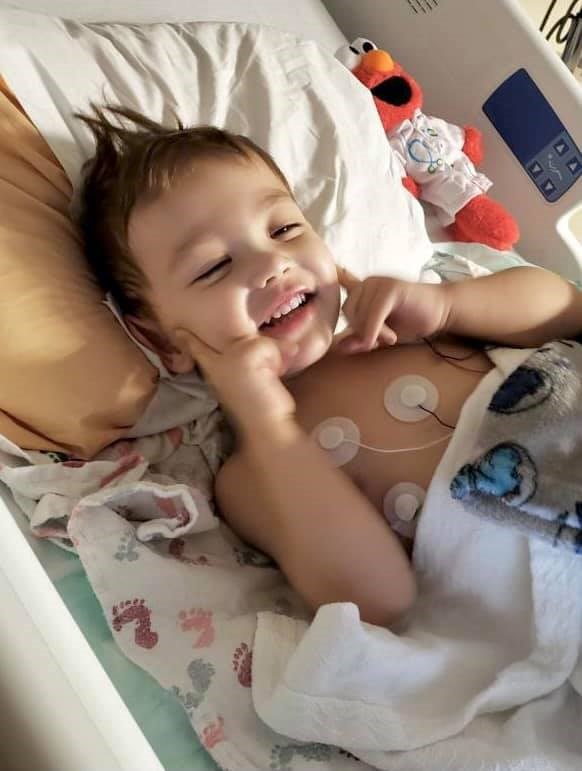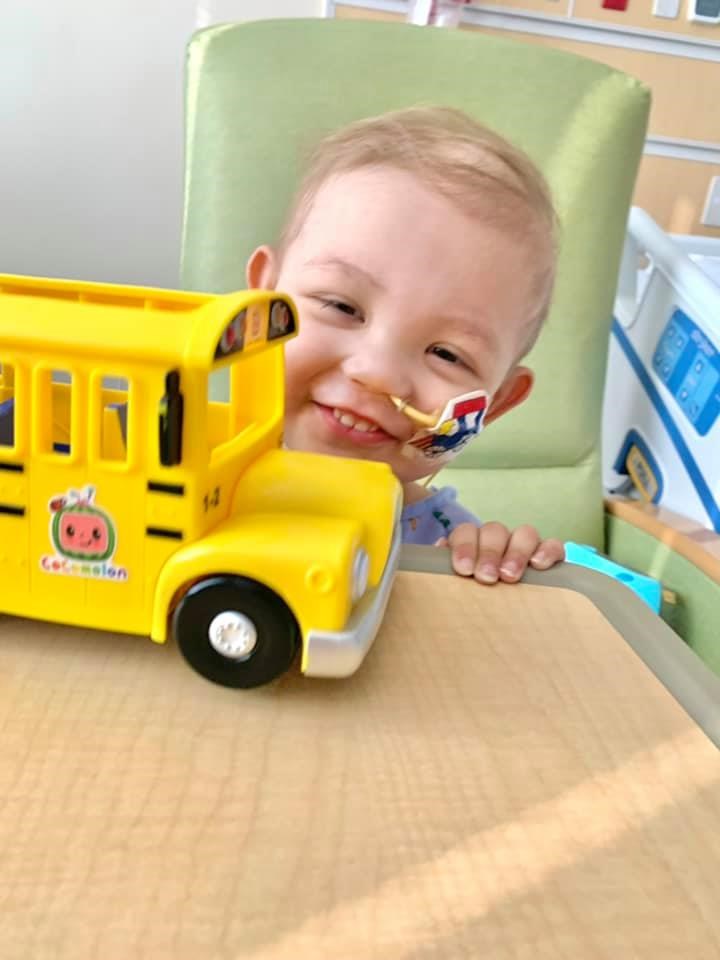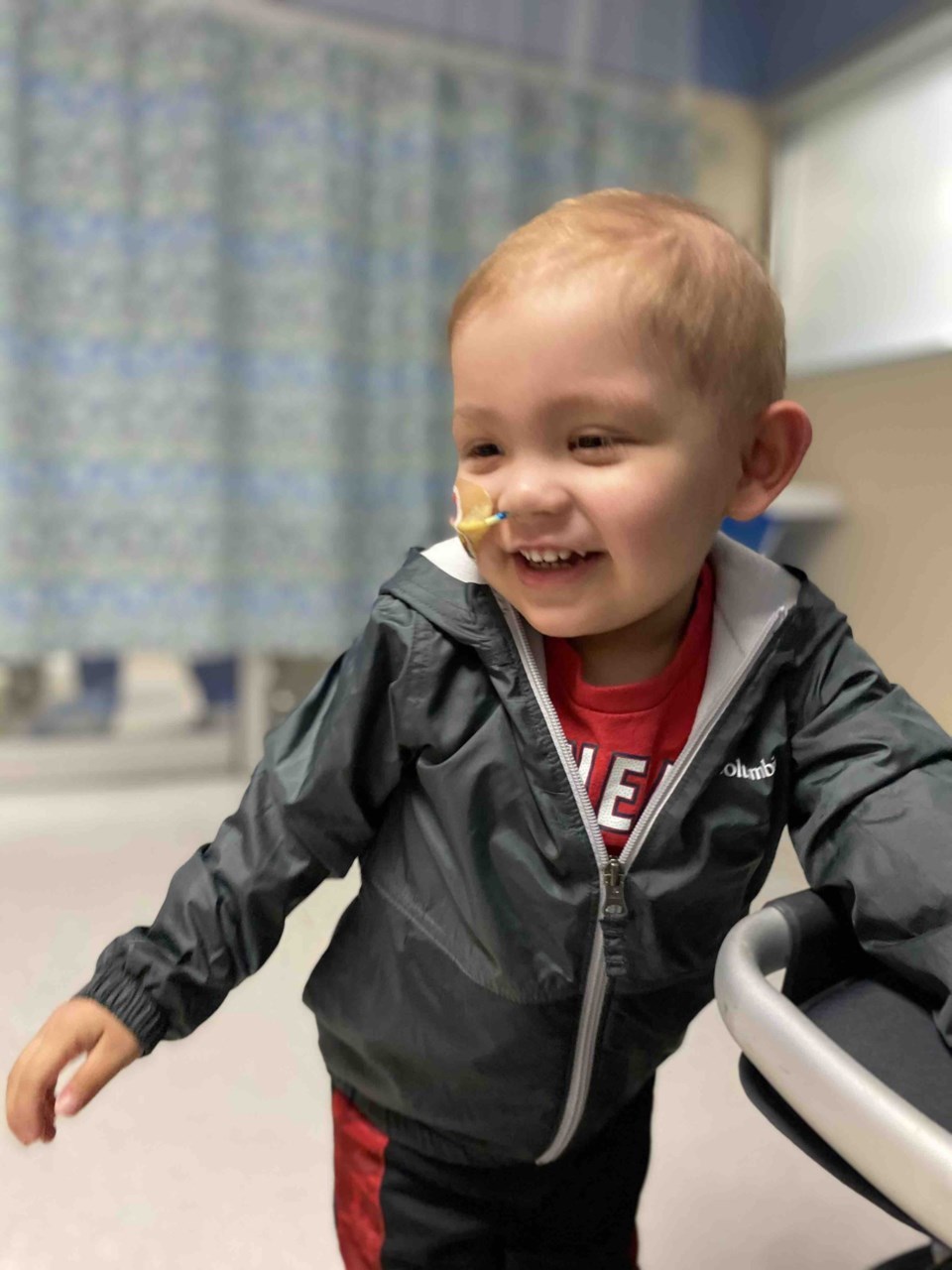Samantha Gerber said the day her 2-year-old son, Christian, was diagnosed with the rarest and most aggressive form of lymphoma was “one of those things you just don’t forget.”
Christian had been experiencing extreme fatigue just a few days before Christmas in December 2020. Like a good mother, Gerber took her son to an urgent care, who said he was only fighting a mild virus. But her “motherly gut instinct” told her something wasn’t right. So, she took him to another urgent care, who said her son was only teething.
“And I’m thinking, ‘God, this just doesn’t make sense,’” Gerber said. “You just know your child better than anyone.”
And she was right. Shortly after Christian’s urgent care trips, Gerber said he started bumping into things that he never did normally. She took him straight to the emergency room on Dec. 22 after she found him crying in his room, unable to even find his bed because he couldn’t see.
On Dec. 23, Gerber was given news that turned her family’s entire world upside down. Christian had Stage 4 Burkitt’s lymphoma in his brain.
Burkitt’s Lymphoma
The doctor knew right off the bat that something wasn’t right when Gerber brought Christian to the Children’s Medical Center in Plano. By the time doctors finished Christian’s MRI, he couldn’t see her hand in front of his face.
“As soon as the doctor came in, he was like, ‘Okay. I have not-so-good news.’ And I told him, ‘Stop. Hold on. I cannot listen to this without my husband,’” Gerber said.
After Geber got her husband on the phone, the doctor told them that Christian had a mass in his brain, and things did not look good. His brain tumor had grown so fast that it was pressing against his optic nerve, causing blindness.
“I pretty much felt like I was going to faint,” Gerber said. “And I remember the first thing I thought about is, ‘Oh, my God. I don’t know what life looks like without Christian.’”
Christian was then transported to a children’s hospital in Dallas and underwent a biopsy. There, he got his official diagnosis. Specifically, Christian’s diagnosis is Stage 4 Sporadic Burkitt lymphoma. This type of Burkitt’s lymphoma accounts for 30% of all childhood lymphomas, but an abdominal tumor is the most common site of occurrence, according to the Lymphoma Research Foundation’s website. Christian’s site of occurrence happened to be in his brain.
“And after that moment, everything moved very fast from that point on,” Gerber said.

The Treatment
The problem with Burkitt’s lymphoma is its aggressiveness. Because of that, there isn’t even a Stage 1 or Stage 2 — “you only catch it when something’s already going wrong,” Gerber said.
“It’s truly one white blood cell that decided to cause hell for Christian and everyone involved and everyone who loves him,” Gerber said.
But the aggressiveness of Burkitt’s lymphoma is also, surprisingly, somewhat of a good thing. Because it is so fast-growing, Burkitt’s lymphoma responds well to chemotherapy treatment compared to other cancer types that form over long periods, Gerber said.
Doctors told the Gerbers that Christian’s treatment would last six months. But to treat it, they “have to throw pretty much everything at the wall in order to defeat it.”
“So Christian is getting, at 2 years old, the most intense level of chemotherapy that his body can handle,” Gerber said. “It’s truly a fine line of beating cancer and killing him.”
However, with such aggressive cancer treatment and Christian’s extended hospital stays, the Gerbers are now faced with what Gerber said is “a secondary cancer called ‘how to pay for cancer.’” The family’s first bill was $640,000. And on top of it, Gerber and her husband just moved to Dallas from Houston last year and started new jobs making less than they were previously.
“I mean, for a while, I was really quite the disturbed at the timing of everything,” Gerber said. “Like, God, why would we do this right now? You know, we were both very comfortable in Houston making six-figure salaries each with great insurance. And that would have been a perfect time to go through cancer.”
Now, the Gerbers are struggling to pay Christian’s bills between their new jobs and health insurance problems. And the cost of Christian’s treatment is only growing.
“We’ve calculated that, from the bills seen, his treatment for about six months of treatment is going to be over $1.5 million,” Gerber said. “I don’t understand how, if you want to be a good citizen and pay your bills, I don’t understand how it’s possible.”
The Community
But that’s where the community comes in. Not only has Christian’s uncle Michael Gerber started a GoFundMe for the family, which has raised $22,940 of its $25,000 goal, but Gerber’s friends, family and even strangers have helped take care of Christian while they are working and brought food to the hospital.
One of the hardest parts of Christian’s treatment is extended hospital stays. And because of COVID-19, Gerber and her husband take turns staying the night with Christian when he’s in the hospital. They also have to stay within 30 minutes of the hospital at all times in case he gets a fever.
“When Christian goes to treatment for his chemo, his is so intense, he has to be admitted,” Gerber said. “You know, he’s been in the hospital more than he’s been out of the hospital the past 90 something days.”
Gerber’s brother now lives with them full-time to take care of Christian so she and her husband can work to pay for the costly medical expenses. It was an act of kindness that Gerber said is “priceless.”
“I think that the support from strangers, from my family, from friends, from people you haven't talked to in forever, those things really make a difference for anyone who has to go through this type of experience,” Gerber said. “So it feels like you’re just being pushed to a limit of like, ‘OK, how do I handle this?’ But that’s where I always [try to] find the joy. Because when things seem so impossible, things really pectinate itself to solve itself.”
The Outlook
The good news is that Christian will, most likely, make it out of this particular battle with cancer. But the problem is that because of the aggressive chemotherapy and radiation treatments his body has had to endure, it’s probable that he will get cancer again in the future, Gerber said.
And while Christian has managed to gain back a lot of his eyesight, the chances of him seeing 100% again are slim to none. The tumor damaged Christian’s optic nerve, which doesn't regenerate.
Gerber said the tumor’s damage caused what are called “holes” in Christian’s vision. But, on the bright side, Christian can see enough to function relatively normally.
“He is able to see, [and] he can get around the house,” Gerber said. “He can actually do quite a lot of things like mobility and all that, which is wonderful. And I’m very, very thankful for that.”

The Fight
At just 2 years old, every picture Gerber has posted of Christian shows him with a big smile on his face. And although he can’t even talk, Christian has fought his battle with cancer like a champ. Gerber credits Christian’s resilience to his upbringing and outgoing nature.
“I think a lot of it is Christian’s social personality,” Gerber said. “He likes people. He likes being around people, and I know a lot of that is because he learned that from our family. We come from such a big family that he grew up like that.”
Gerber said she finds her strength in being an advocate for Christian’s treatment process and even has a new outlook on life because of the experience. She said she has been a planner her entire life — planning life events weeks and even years in advance.
But Christian’s cancer is not something she did or can continue to plan for. Her tendency to plan things out has now gone “out the window.” All the Gerbers can hope for now is that Christian continues to keep his spirits high and his cancerous cells low.
“I have never lived my life ever truly day to day… and there’s almost kind of a renewed view on life,” Gerber said. “You don’t get the opportunity any longer to just kind of live passively when you know that you’re truly facing life and death kind of every day. So, that’s where I think that, you know, my voice has really been able to seep through — is being able to live very much in the present.”




